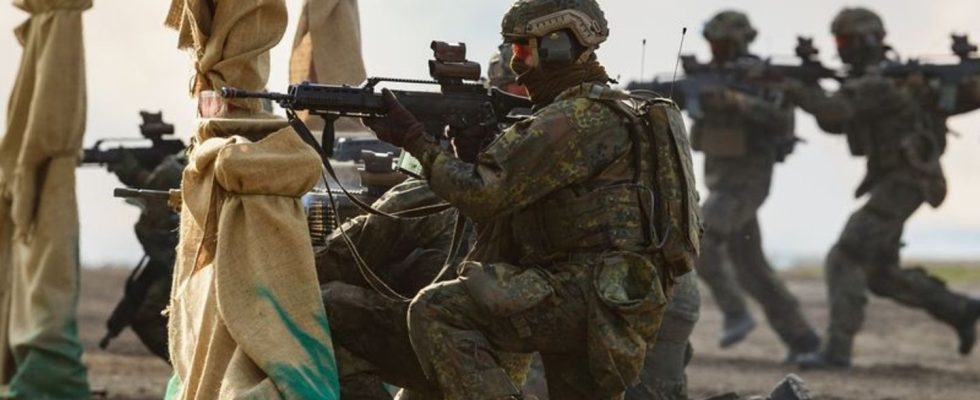defense industry
Does the “parliamentary loop” delay arms procurement?
Bundeswehr soldiers perform a combat exercise. photo
© Philipp Schulze/dpa
Are the political controllers a brake on the modernization of the Bundeswehr? Advisors to Economics Minister Habeck list proposals for faster procurement of equipment and weapons.
An advisory board led by Federal Economics Minister Robert Habeck (Greens) recommends simplifying the procurement of armaments and dispensing with the “parliamentary loop” in the decision-making process. The Scientific Advisory Board at the Federal Ministry of Economics warned on Tuesday in Berlin that the Budget Committee is demanding that military procurement contracts worth more than 25 million euros be submitted for approval, contradicts the separation of powers, invites renegotiations and weakens the Bundeswehr’s negotiating position vis-à-vis industry.
“In a night prank, the parliament got a competence to which it is not entitled. And you have to make it clear to it that it behaved badly and that it should please take it back,” said Christoph Engel (Max Planck Institute Bonn), leading member of the non-governmental working group, at the presentation of the report. Regarding considerations of significantly increasing the amount for such templates, he said: “Our proposal is not to increase the 25 million limit, but to abolish the parliamentary loop.”
Counterproductive Rules
The procurement process is “delayed by various counterproductive regulations,” the Scientific Advisory Board stated. The Although the Bundeswehr has a special fund of 100 billion euros at its disposal, the procurement of urgently needed weapon systems is progressing slowly.
The experts recommend a clear separation of the tasks of government and parliament. They demanded: “The upcoming modernization of the Bundeswehr should be used to experiment with simplifications in the award procedure and to open up the innovative potential of military research and development, also for later civilian applications.”
The Advisory Board also proposes shortening the process of review procedures, relaxing the requirement for small and medium-sized enterprises, and expanding the possibility of incentive contracts for industry. Ultimately, the simplifications in procurement should not be limited to goods with purely military use, but should be extended to cover the entire needs of the Bundeswehr. Advisory Board Chairman Klaus Schmidt (Ludwig-Maximilians-Universität Munich) demanded: “Experience with military procurement should be used to speed up other procurement processes and large-scale projects.”
Is “culture change” necessary?
In the Federal Armed Forces Procurement Office (BAAINBw) in Koblenz, a “cultural change” is necessary, according to the experts after discussions in the federal authority. However, they certify that the employees often do a reasonable job, but they should contradict the wishes and requirements of the military more often and more energetically. However, there is an “imbalance” when the highest military authorities meet middle-level officials. Defense Minister Boris Pistorius (SPD) is required here.
Expectations in the procurement authority that there could be complaints against awards, which would trigger a review procedure involving several instances, also led to a delay. “The Basic Law does not require several instances, but only one instance. And the instance that would offer itself would be the first instance that is already active, namely the public procurement chamber in the Federal Cartel Office,” said Engel. “Then you would have to justify the need for this procurement chamber to be treated like a court. The European Union does that anyway.”
The scientists also recommend giving military research more weight, taking the US Defense Research Agency (Darpa) and its “foresight” as a role model. “For understandable historical reasons, the Federal Republic of Germany has so far held back from funding military research. But technical superiority is of crucial importance for deterrence,” say the scientists. And: “Therefore, instruments of innovative procurement should be used more and the strict separation of civil and military areas should be relaxed, especially in the area of basic research.”

